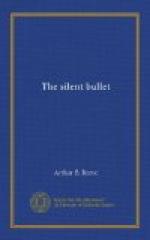“But the coroner, I understand, thinks differently,” prompted Kennedy.
“Yes, the coroner has declared the case to be accidental. He says that the weight of evidence points positively to asphyxiation. Still, how can it be asphyxiation? They could have escaped from the room at any time; the door was not locked. I tell you, in spite of the fact that the tests for poison in their mouths, stomachs, and blood have so far revealed nothing, I still believe that John Templeton and Laura Wainwright were murdered.”
Kennedy looked at his watch thoughtfully. “You have told me just enough to make me want to see the coroner himself,” he mused. “If we take the next train out to Williston with you, will you engage to get us a half-hour talk with him on the case, Mr. Whitney?”
“Surely. But we’ll have to start right away. I’ve finished my other business in New York. Inspector O’Connor—ah, I see you know him—has promised to secure the attendance of anyone whom I can show to be a material witness in the case. Come on, gentlemen: I’ll answer your other questions on the train.”
As we settled ourselves in the smoker, Whitney remarked in a low voice, “You know, someone has said that there is only one thing more difficult to investigate and solve than a crime whose commission is surrounded by complicated circumstances and that is a crime whose perpetration is wholly devoid of circumstances.”
“Are you so sure that this crime is wholly devoid of circumstances?” asked Craig.
“Professor,” he replied, “I’m not sure of anything in this case. If I were I should not require your assistance. I would like the credit of solving it myself, but it is beyond me. Just think of it: so far we haven’t a clue, at least none that shows the slightest promise, although we have worked night and day for a week. It’s all darkness. The facts are so simple that they give us nothing to work on. It is like a blank sheet of paper.”
Kennedy said nothing, and the district attorney proceeded: “I don’t blame Mr. Nott, the coroner, for thinking it an accident. But to my mind, some master criminal must have arranged this very baffling simplicity of circumstances. You recall that the front door was unlocked. This person must have entered the house unobserved, not a difficult thing to do, for the Wainwright house is somewhat isolated. Perhaps this person brought along some poison in the form of a beverage, and induced the two victims to drink. And then, this person must have removed the evidences as swiftly as they were brought in and by the same door. That, I think, is the only solution.”
“That is not the only solution. It is one solution,” interrupted Kennedy quietly.
“Do you think someone in the house did it?” I asked quickly.
“I think,” replied Craig, carefully measuring his words, “that if poison was given them it must have been by someone they both knew pretty well.”




